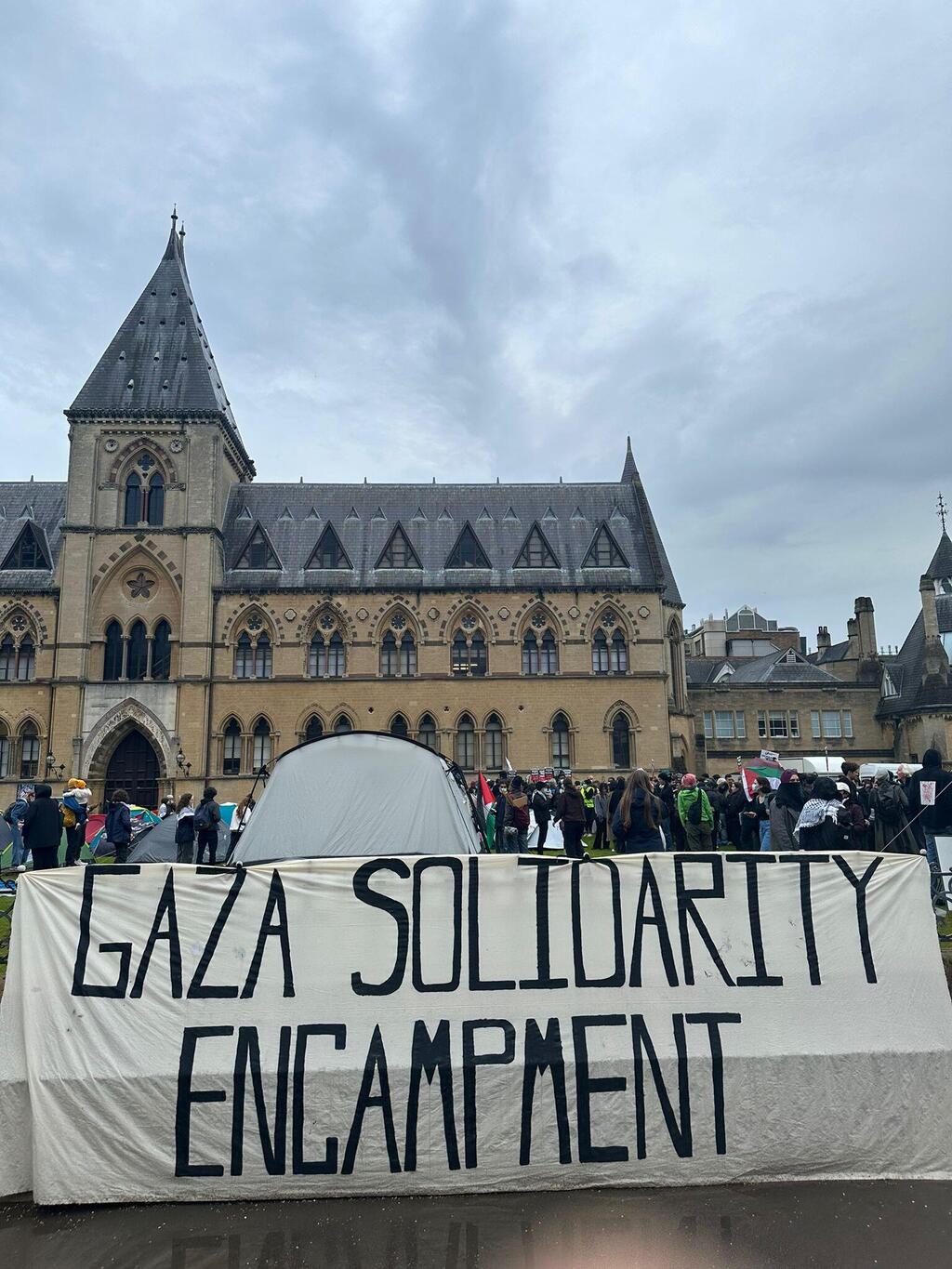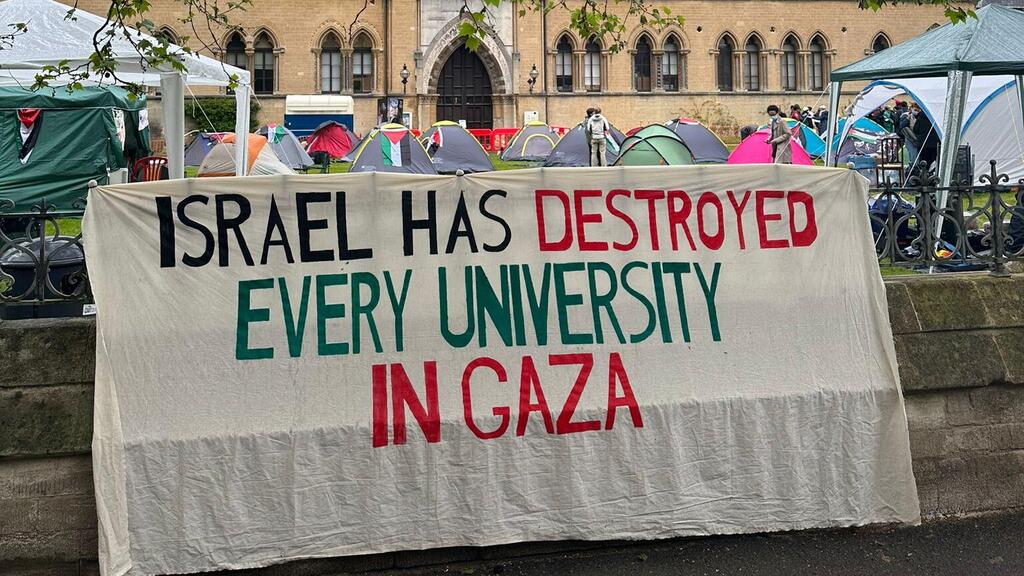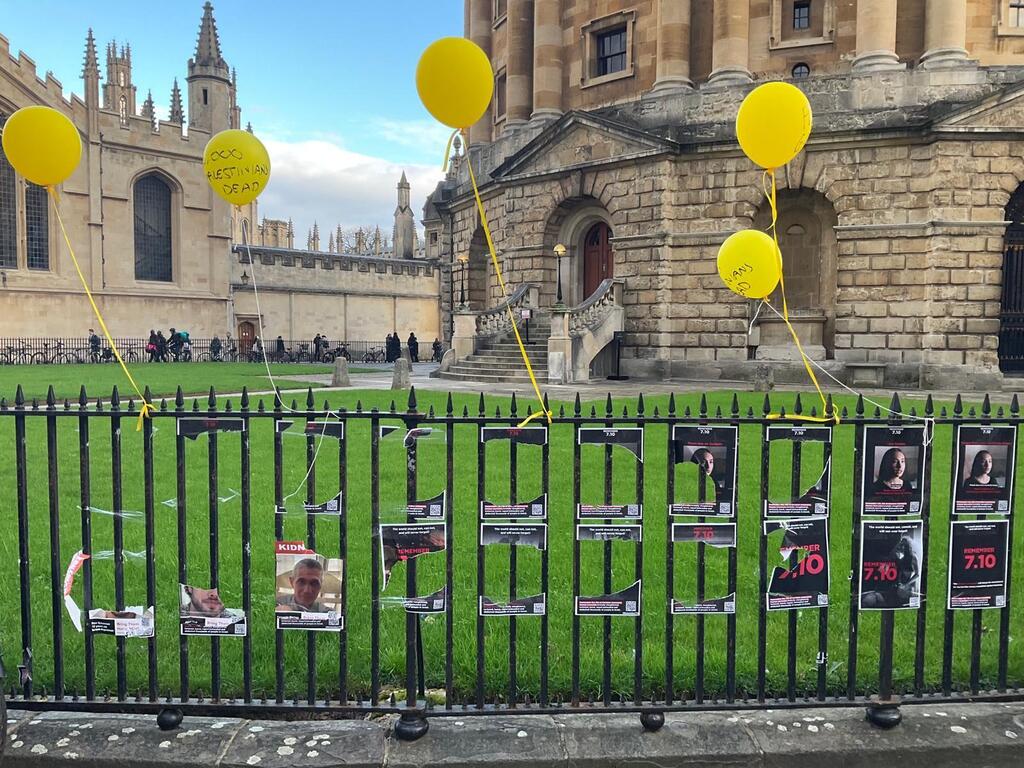For P., an Israeli woman in her twenties, the dream of studying at Oxford had always been a cherished ambition. But when she first envisioned walking among the Gothic spires of the prestigious British institution, she never imagined that her first day of classes on October 9, 2023, would be marred by grief and anxiety. That morning, she learned that her uncle had been murdered and her aunt kidnapped to Gaza. Nor did she foresee that the first sight greeting her on her way to class would be anti-Israel protests, complete with signs and chants denying her country’s right to exist.
"Oxford is an unpleasant place for Israelis and Jews, and there’s nothing we can do to help you," was the response from the student welfare officer at the esteemed university when P. sought support.
Hostility, exclusion and discrimination were not isolated to her experience alone. In interviews conducted by Ynet and Yedioth Ahronoth, Jewish and Israeli lecturers and students at the prestigious British universities of Oxford and Cambridge described recurring incidents involving both faculty and peers. Over 100 antisemitic and anti-Israel incidents were detailed in a letter submitted by a group of Israelis to the Oxford administration.
"On October 7, I was in Israel during the holiday break between semesters when rockets began falling incessantly in my area. Amid the fear and uncertainty, I received WhatsApp notifications from my college. Someone decided to announce demonstrations in support of 'freedom fighters who came to liberate Palestine,' effectively endorsing the murder of Israelis. None of the other doctoral students argued with her; instead, they sent her supportive emojis," recounted A., a doctoral student at Oxford. "I wrote to her, hoping to discuss it, thinking she might not fully understand, but she refused, calling me a 'child murderer.' I approached my college head with the details, and she simply apologized, unsure of what to do. She referred me to my academic advisor, who was equally clueless. Nothing was done about it. Since then, I haven’t set foot in the college."
Oxford University administration held several meetings with Israeli representatives after the October 7 terror attack, at the students' request, but no progress or action plan was achieved to prevent the recurrence of antisemitic incidents. On the contrary, tensions at the university escalated in May.
Inspired by the protest camp at Columbia University in New York, Oxford students arrived on campus with sleeping bags and signs, calling on the university to divest from "investments related to the Israeli occupation and genocide" and to sever institutional ties with Israeli universities. A joint statement from the organizations "Cambridge for Palestine" and "Oxford Stands for Palestine" declared: "We refuse to accept our universities' partnership in Israel's war crimes. Oxford’s profits cannot continue to climb at the expense of Palestinian lives." Nearly 200 Oxford staff members signed a letter of support.
"It’s become routine for the city center, which is essentially the university center, to become an area on Saturdays where Jews avoid going," described L., a university faculty member, with frustration. "The hostility is starting to spill more and more into the public space from the online space."
The faculty member emphasized that her frustration stems not from the existence of pro-Palestinian demonstrations, but from the antisemitic and anti-Israel chants heard at them. "Swastikas and chants like 'gas the Jews,’ heard here, greatly undermine our sense of security on campus," the faculty member said.
Oxford University’s Head of Diversity, Professor Tim Soutphommasane, told Ynet and Yedioth Ahronoth that "Oxford should be a place where all its members feel safe and welcome. Based on conversations and exchanges we have had with Jewish students and staff, I recognize that not everyone feels this way currently. We are determined to fix this."
Students at the prestigious counterpart university in England, Cambridge, described similar hostility to that experienced by many Israelis at Oxford over the past eight months. Alongside swastikas in restrooms, vandalized images of Israeli hostages held in the Gaza Strip, and tents with violent messages, students reported fearing other students who walked around with knives. Instead of tackling antisemitism, senior academic officials referred them to "mental support."
One of the most notorious anti-Israel incidents that occurred at Cambridge since October was the defacement of Lord Balfour's portrait in one of the colleges, due to his support for Zionism over 100 years ago.
"I feel unsafe knowing that someone in my college, filled with hatred against Israelis and Jews, freely roamed the library with a knife in her bag," said a doctoral student at the college. "Even friends from my four years of study didn’t bother to check on me after October 7, but felt comfortable expressing sympathy for people they don’t know in Gaza."
B., who is currently wrapping up her bachelor's degree at Cambridge, shared her experience. "Back on October 8, a group of Israelis and Jews sent a letter to the university, urging the institution to denounce calls for an intifada in the streets. The university president expressed her regret over our struggles and directed us to university psychologists. Since then, we've heard nothing from her. Months later, when she visited the Chabad House, we greeted her and introduced ourselves as the authors of the letter. Once we mentioned our names, she turned around, took her coat and left. We were stunned by her reaction."
A spokesperson for Oxford University said in a statement: "The University of Oxford rejects and condemns antisemitism. There is no place for unlawful discrimination of any kind directed toward any faith, race, nationality or ethnic group at the University. We are committed to ensuring that all students feel safe and included and we investigate all formal complaints made about harassment or discrimination.
"University leaders and officers have been meeting with Jewish students and staff who have raised concerns about antisemitism, including the authors of a recent open letter. We are working to support them and to strengthen our response to harassment.
"We have also recently issued new guidance on arranging and taking part in protests. We expect all members of our university to be prepared to conduct themselves with respect, civility and empathy.”"
A spokesperson for Cambridge University responded to the allegations: "It would be a falsehood to claim the university hasn’t been addressing students’ concerns. Senior leaders at the university have been meeting regularly with members of the Jewish Society since October to hear directly about the anxieties they have.
"Our priority is the safety of all our students and staff. We are in regular contact with our Jewish students and chaplains, assuring them of our support and that we will not tolerate antisemitism. We have consistently asked members of our community to treat each other with understanding and empathy.
"The protests have so far been peaceful, but we retain the right to intervene and have made our guidelines clear to the protesters. They have also shared their community guidelines with us and have so far stayed within their stated commitments. We support academic freedom, freedom of speech and the right to protest, all within the law, and we regularly take legal advice and liaise with police."




